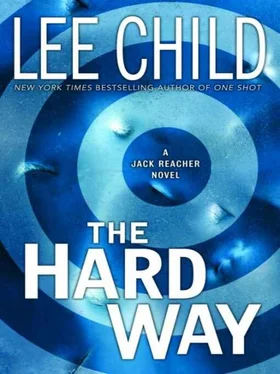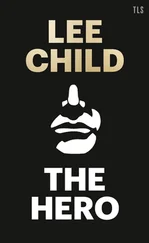He looked back at the door and saw Perez walk in. Then Kowalski. Then Edward Lane himself, third in line. Then Gregory, and Groom, and Addison, and Burke. Roll-on bags, duffels, suit carriers. Jeans and sport coats, black nylon warm-up jackets, ball caps, sneakers. Some shades, some earphones trailing thin wires. Tired from the overnight flight. A little creased and crumpled. But awake and alert and aware. They looked exactly like what they were: a group of Special Forces soldiers trying to travel incognito.
He watched them line up at the desk. Watched them wait. Watched them shuffle up one place at a time. Watched them check in. Watched the clerk give Lane the message. Saw Lane turn around, searching. Lane’s gaze moved over everybody in the lobby. Over Pauling, without stopping. Over the fractious family. Onto Reacher’s own face. It stopped there. Lane nodded. Reacher nodded back. Gregory took a stack of key cards from the clerk and all seven men hoisted their luggage again and started through the lobby. They eased their way through the crowds shoulders first and stopped in a group outside the ring of armchairs. Lane dropped one bag and kept hold of another and sat down opposite Reacher. Gregory sat down too, and Carter Groom took the last chair. Kowalski and Perez and Addison and Burke were left standing, making a perimeter, with Burke and Perez facing outward. Awake and alert and aware, thorough and cautious.
“Show me the money,” Reacher said.
“Tell me where Taylor is,” Lane said.
“You first.”
“Do you know where he is?”
Reacher nodded. “I know where he is. I made visual contact twice. Last night, and then again this morning. Just a few hours ago.”
“You’re good.”
“I know.”
“So tell me where he is.”
“Show me the money first.”
Lane said nothing. In the silence Reacher heard the harassed mother say: Draw a picture of Buckingham Palace . He said, “You called a bunch of London private eyes. Behind my back. You tried to get ahead of me.”
Lane said, “A man’s entitled to save himself an unnecessary expense.”
“Did you get ahead of me?”
“No.”
“Therefore the expense isn’t unnecessary.”
“I guess not.”
“So show me the money.”
“OK,” Lane said. “I’ll show you the money.” He slid the duffel off his knees and placed it on the floor and unzipped it. Reacher glanced right. Glanced left. Saw the kid about to throw the tattered bear again. Saw him catch the expression on Lane’s face and saw him shrink back toward his mother. Reacher shuffled forward on his chair and leaned down. The duffel was full of money. One of the O-Town bales, newly opened, part depleted.
“No trouble on the flight?” he asked.
Lane said, “It was X-rayed. Nobody got their panties in a wad. You’ll get it home OK. Assuming you earn it first.”
Reacher pulled back the torn plastic and put a fingernail under one of the paper bands. It was tight. Therefore full. There were four equal stacks of twenty bricks each. Total of eighty bricks, an even number. A hundred hundreds in each brick. Eighty times a hundred times a hundred was eight hundred thousand.
So far, so good.
He lifted the edge of a bill and rubbed it between his finger and thumb. Glanced across the lobby to the brass sign at the Xerox station: By statute some documents may not be photocopied . But these hadn’t been. They were real. He could feel the engraving. He could smell the paper and the ink. Unmistakable.
“OK,” he said, and sat back.
Lane leaned down and zipped the duffel. “So where is he?”
Reacher said, “First we have to talk.”
“You better be kidding me.”
“There are civilians there. Innocent people. Noncombatants. A family.”
“So?”
“So I can’t have you charging in there like maniacs. I can’t allow collateral damage.”
“There won’t be any.”
“I need to be sure of that.”
“You have my word.”
Reacher said, “Your word ain’t worth shit.”
“We won’t be shooting,” Lane said. “Let’s be clear on that. A bullet is too good for Taylor. We’ll go in and we’ll get him and we’ll bring him out without harming a hair on his or anyone else’s head. Because that’s the way I want it. I want him all in one piece. I want him alive and well and conscious and feeling everything. He’ll tell us about his partner and then he’ll die, long, slow, and hard. Over a week or two. So a gunfight is no good to me. Not because I care about noncombatants, true. But because I don’t want any accidents with Taylor. I would hate to give it to him easy. You can take my word on that .”
“OK,” Reacher said.
“So where is he?”
Reacher paused. Thought about Hobart, and Birmingham, Alabama, and Nashville, Tennessee, and kindly white-haired doctors in lab coats holding artificial limbs.
“He’s in Norfolk,” he said.
“Where’s that?”
“It’s a county, north and east of here. About a hundred and twenty miles.”
“Where in Norfolk?”
“A place called Grange Farm.”
“He’s on a farm?”
“Flat country,” Reacher said. “Like a pool table. With ditches. Easy to defend.”
“Nearest big city?”
“It’s about thirty miles south and west of Norwich.”
“Nearest town?”
Reacher didn’t reply.
“Nearest town?” Lane asked again.
Reacher glanced back at the reception desk. By statute some documents may not be photocopied . He watched a Xerox machine at work, a ghostly stripe of green light cycling horizontally back and forth beneath a lid. He glanced at the harassed mother and heard her voice in his head: Why don’t you draw a picture of something you’re going to see ? He looked at the kid’s doll, missing an arm. Heard Dave Kemp’s voice, in the country store: It felt like a thin book. Not many pages. A rubber band around it . Recalled the tiny imperceptible impact of the kid’s tattered bear skidding on the tile and landing against his shoe.
Lane said, “Reacher?”
Reacher heard Lauren Pauling’s voice in his mind: A little is sometimes all you need. Going out, they don’t care as much as when you’re coming in .
Lane said, “Reacher? Hello? What’s the nearest town?”
Reacher dragged his focus back from the middle distance, slowly, carefully, painfully, and he looked directly into Lane’s eyes. He said, “The nearest town is called Fenchurch Saint Mary. I’ll show you exactly where it is. Be ready to leave in one hour. I’ll come back for you.”
Then he stood up and concentrated hard on walking infinitely slowly across the lobby floor. One foot in front of the other. Left, then right. He caught Pauling’s eye. Walked out the door. Down the concrete steps. He made it to the sidewalk.
Then he ran like hell for the parking garage.
REACHER HAD PARKEDthe car, so he still had the keys. He blipped the door from thirty feet away and wrenched it open and threw himself inside. Jammed the key in the ignition and started the motor and shoved the stick in reverse. Stamped on the gas and hurled the tiny car out of the parking space and braked hard and spun the wheel and took off again forward with the front tires howling and smoking. He threw a ten-pound note at the barrier guy and didn’t wait for the change. Just hit the gas as soon as the pole was raised forty-five degrees. He blasted up the ramp and shot straight across two lanes of oncoming traffic and jammed to a stop on the opposite curb because he saw Pauling hurrying toward him. He threw open her door and she slid inside and he took off again and he was twenty yards down the road before she got the door closed behind her.
Читать дальше












